Analyses
Jamoh’s three years in office: Achievements, Prospects, Projections

Today marks the third year when Dr Bashir Jamoh was appointed as the Director-General of the Nigerian Maritime Administration and Safety Agency(NIMASA).
During these eventful years, Nigeria’s maritime industry has witnessed astronomical growth and quantum development which has earned the country international recognition and goodwill.
In this comprehensive profile of the administration of the Kaduna State-born technocrat in NIMASA, theeyewitnessnews reporter takes a cursory look at the achievements, prospects and projections of the agency to make the industry more robust for efficiency, investments and accelerated growth.
The Mandate
The Nigerian Maritime Administration and Safety Agency (NIMASA) was established by an Act of Parliament (The NIMASA Act 2007) with two cardinal objectives, namely;
- To Regulate and Promote Maritime Safety, Security, Marine Pollution and Maritime Labour.
- To promote the development of Indigenous Commercial Shipping in International and Coastal Shipping Trade
The Agency derives its mandate from four Acts of the National Assembly. These are NIMASA Act, 2007, Cabotage Act, 2003, Merchant Shipping Act, 2007 and SPOMO Act, 2019.
VISION
To be the leading maritime administration in Africa advancing Nigeria’s global maritime goals
MISSION
To achieve and sustain safe, secure shipping, cleaner oceans and enhanced maritime capacity in line with global best practices towards Nigeria’s economic development
OUR CORE VALUES
C – COMMITMENT
A – ACCOUNTABILITY
P – PROFESSIONALISM
I – INTEGRITY
T – TEAMWORK
E – EXCELLENCE
L – LEADERSHIP
D – DISCIPLINE
OUR PERFORMANCE TRIPOD
MARITIME SECURITY S1:
Security of the Maritime Domain is very critical to the day-to-day operation of the sector. Security helps to boost investors’ confidence; hence, the following key accomplishments are under the current dispensation.
- Signing into law of the SPOMO Act by Mr. President
- The launch of the Deep Blue Project
- Significant Reduction in Piracy and Kidnappings
- Arrests and Successful Prosecution of Criminals
- Leadership of Regional Maritime Collaboration Forum to tackle Insecurity
- Nigeria’s Removal from IBM’s Red List



AIM OF THE DEEP BLUE PROJECT
The aim of the project is to establish a sustainable architecture for improved maritime safety and security through increased monitoring and compliance enforcement within Nigeria’s Exclusive Economic Zone (EEZ), with a view to effectively tackling the challenges of piracy in the Gulf of Guinea.
THE DEEP BLUE PROJECT ASSETS BREAKDOWN
Classified into 3 (three) with over 254 personnel drawn from Military and paramilitary organizations. These are; Marine, Land and Air Assets.
- Marine Assets
Special Mission Vessels – 2 (DB Abuja and DB Lagos)
Fast Intervention Boats – 17
- Air Assets
Special Mission Helicopters 3
Special Mission Aircrafts 2
Unmanned Aerial Vehicles (UAVs)
- Land Assets
Armored Vehicles – 17
Facilities – Command, Control, Computer, Communication and Intelligence (C4i) Centre, Training Facilities (Shooting Range, C4i Training Centre etc.). Training; various training for all personnel in the deep blue project on the assets and facilities.

THE INTER-OPERABILITY OF THE DEEP BLUE ASSETS

- Effective implementation of the Deep Blue Project contributed to the reduction in piracy cases with only one piracy case as of May 2022, 6 cases in 2021 from 35 cases in 2020 and 2019 respectively

OUR PERFORMANCE TRIPOD
MARITIME SAFETY S2:
The Agency observed that shipping is critical to global trade, yet it is the most vulnerable in terms of safety. This explains the reason the IMO (International Maritime Organization) adopted the Safety of Life at Sea (SOLAS) convention to ensure the safety of those involved.
Consequently, empowered by enabling legislations, NIMASA takes this as a critical aspect of its job to ensure safety of ships and those on board, through proper enforcement of maritime safety conventions.
ACHIEVEMENT AND INITIATIVES



OUR PERFORMANCE TRIPOD
SHIPPING DEVELOPMENT S3


The critical aspect of shipping development encompasses fleet expansion, shipbuilding and ship repairs. Shipping is responsible for over 90 percent of international transportation of goods that sustain the global supply chain, which is a significant component of the global economy, enhancing imports and exports of goods and services.
NIMASA is poised to advance shipping by ensuring a conducive environment for commercial shipping and encouraging more indigenous participation in the global shipping trade.

NSDP BREAKDOWN AS AT OCTOBER 2021
WASTE TO WEALTH PROGRAMME / EMPLOYMENT GENERATION – 1,190 MARINE LITTER MARSHALS

The Making of Nigeria’s Blue Economy Strategic Document
- Vice President His Excellency Yemi Osinbajo will Chair the Expanded Committee on the Blue Economy Strategy Development and its Implementation Task Team.
- The Federal Ministry of Transportation under the leadership of the Honourable Minister for Transportation, Rt. Hon. Chibuike Amaechi
- Federal Ministry of Transportation as the Secretariat
BLUE ECONOMY AND LITTORAL STATES ENGAGEMENT


CABOTAGE VESSEL FINANCING FUND (CVFF) – STATUS OF DELIVERY
Presidential approval was granted for disbursement.
Primary lending institutions appointed.
Disbursement is likely second quarter of 2023.
MARITIME SAFETY
The Federal Executive Council, at the end of the last quarter of 2021, approved the wreck removals from the Badagry axis up to the Tincan Island project has gone


very far.
Again, in the first quarter of 2022, the Federal Executive Council approved the removal of the entire wrecks also in the other zones of Nigeria, comprising the Western zone with headquarters in Lagos, Eastern zone headquarters in Port Harcourt, and then the central Zone headquarters in Warri. All these projects have achieved major milestones.
We engaged the Nigerian Navy Naval Dockyard in Lagos to repair our operational vessels, Millennia 1 and Millennium 2. Today both vessels and five others are almost ready

for deployment for enforcement purposes. This will also enhance our search and rescue operation, and port and flag state administration amongst others.
In other to attend to the emergencies that may occur after Search and Rescue operations, the Agency has built two brand new Search and Base clinics of international standard at Azare Crescent, Apapa and Kirikiri. We are hopeful to commission it soon. The hospital is not for NIMASA or Nigeria, but for the original Regional States, NIMASA is in charge of nine countries in terms of Search and Rescue. The hospital is of high international standard, we hope to treat all calibers of patients locally, and internationally, with the state-of-the-art equipment the facility will possess, when completed.
In the area of our Flag and Port State Administration, at the inception of the administration, there was no single vessel for enforcement. Today, we have built seven brand new bulletproof boats and we expect them to have completed the building. They are being built in Spain, and we are hoping that before the end of March, we will receive and commission the vessel.
As soon as the vessels are commissioned, there will be enhanced enforcement performance; and we plan to divide the use of the vessels; not only in Lagos but also in other zones of the Agency. All these will cater for the issue of safety.
MARITIME SECURITY
Before 2019, we do not have law, separate law that tried these offenders and criminals that we arrest those involved in piracy and kidnapping.
Therefore, we are trying to get this formal act Suppression of Piracy and other Maritime Related Offences (SPOMO) Act signed by Mr. President in June 2019. As of today, we have secured convictions under this Act. This has also served as a deterrent to would-be criminals.
To further deter these criminalities on the waterways and make our youths gainfully employed, the Agency engaged the Marine Litter Marshals Usually;
In the area of education, the Agency introduced the Nigerian Seafarers Development Programme (NSDP). The Nigerian NSDP development program is a capacity development programme.
Now in order to ensure that we do not forget our own training institution in Nigeria, we have improved our interface with the Maritime Academy of Nigeria (MAN) Oron. The Agency’s statutory funding of the Maritime Academy of Nigeria in Oron has been on point since 2020.
We have Simulators, among other state-of-the-art facilities, and the funding by NIMASA has been unhindered. This is in addition to other private maritime institutions, the private like Charkins, which are now also coming up with a lot of accreditation of diplomas and other short-term certificates that we are doing it locally, saving foreign exchange that we are having.
In addition to this initiative, the Agency created skill acquisition centres across six geopolitical zones. For the South-West we have Lagos, in the South-East we have Anambra, for South-South we have Bayelsa, in North-East, we have Maiduguri, Borno state; for North-West we have Kaduna State for North Central we have Kwara.
So all these skill acquisition centers have the capacity of training younger Nigerians on different aspects of professionalism under that. This is to help trim the number of this criminality in our own territorial waters. Records, therefore, show that from the third quarter of 2021 until date, we have never recorded one single attack in our own territorial water.
Analyses
Dantsoho: Turning Eastern ports to beautiful bride among Shippers through infrastructural upgrade, focused leadership

Analyses
Nigeria Maritime media celebrates Adeniyi over his transformational leadership as Customs boss

Analyses
Maritime Labour’s selfish stand against Ports and Harbour Bill

The Eyewitness News Analysis
For nine years, maritime labour has fought against the passage of the Ports and Harbour Bill 2015.
Initiated in the eighth Assembly and sponsored by Senator Andy Uba of Anambra South Senatorial District in 2015, the bill, read for the first time on the floor of the National Assembly in 2016, seeks, among other things, the decentralization of ports operations by involving more private interests in ports operations.
The purpose is to open up the ports space for massive investments and attract private sector funds that would be used to build massive port infrastructure.
The bill, if allowed to be passed into law, will repeal the Nigerian Ports Authority (NPA) ACT 1955 as amended by Act CAP 126 LFN 2004 and establish Nigerian Ports and Harbour Authority.
The bill seeks to further consolidate the gains of the 2006 ports concession programme which ceded terminal operations functions of the NPA to the private interests.
However, the bill which enjoyed accelerated hearing on the floor of both the Senate and the House of Representatives, was stalled and got stuck at the ninth National Assembly where it had passed through the third and final reading and waiting to be passed to the House of Representatives for concurrence before its transmission to the President for his assent.
The maritime labour under the aegis of the Maritime Workers Union of Nigeria( MWUN) had mobilised its massive membership across the maritime space to stall the passage of the bill.
The major reason for its opposition, according to Comrade Adewale Adeyanju, the President-General of the Union, is the fear of job loss for the teeming members of the union.
The position of the Maritime Workers union is quite understandable and in tandem with the modus operandi of all labour unions.
No matter the nobility and credibility of the objectives of any public service reform, if it conflicts with the interests of the members, the labour unions will fight it.
In as much as we sympathise with the position of maritime labour on the issue of the Ports and Harbour bill, its position against the passage of this noble bill, is at best, selfish and self–serving.
The Union has not controverted the public benefits which the bill, when passed into law, will bring to the Port operations in the country.
Such benefits as attracting more private sector funds to develop the maritime industry and fix the decaying port infrastructure, thus making our ports more attractive and competitive globally.
Over the years, the government has been overwhelmed with the demands to fund public infrastructures, hence its attraction to concessions, collaborations and partnerships with private sectors in order to get their funds for the development of some critical public infrastructures.
The worsening economy in the country has further placed a huge burden on the government so much so that it has started to falter in some of its financial obligations to these public infrastructures.
Further borrowing will sink the economy into a deeper mess as the country still wallows in the anguish of repaying its humongous debts.
So private participation such as the one being sought by the Port and Harbor Bill will save the nation’s sea ports from further decay due to the inability of the government to fund such a huge commitment.
For many years, the Nigerian Ports Authority has been going cap in hands to the multi- national finance companies to seek $800 million needed to rehabilitate the dilapidated ports infrastructures at Apapa, Tin Can, Onne and Calabar ports, an amount the Federal government could not afford.
Many stakeholders fear that the terms for such loans may not be too favourable to Nigeria as the lenders, in order to hedge against any risks, may hold the NPA to ransom, thus mortgaging our ports to foreign interests.
But with the passage of the contended bill, private sector funds will be readily available to carry out such remedial works without necessarily mortgaging our ports to the imperialist multi-national Finance corporations.
The labour union should rise above its selfish and parochial interests and look at the larger picture of the more developed and efficient port system under deregulated port operations.
The same opposition the Labor put up against the port concession programme of 2006 because of fear of job loss.
Yes, the programme recorded some casualties just as similar reform exercises, but the end eventually justified the means.
As widely acknowledged by the stakeholders, port concession, which ceded terminal operations to private interests, has resulted to massive infrastructural rebirth at the Nigerian Ports.
Terminal operations have become highly efficient, fast and safe which has led to a quicker rate of turnaround time of vessels.
The concessionaires have injected massive funds for the infrastructural development of the terminals.
While the concession programme shipped out redundant labourers, those who survived the purge now earn fatter salaries with mouth-watering remunerations and fantastic welfare packages which was not the case during the pre-concession era.
We understand that there would be casualties just as in the port concession programme and other reforms exercises, but those who are left will enjoy the benefits of the reform.
We are not an advocate of job loss especially at this trying time of the economy when the unemployment market is congested but no surgery is carried out without pain.
No reform is without casualties but the end will certainly justify the means.
Rather than the labour union throw away the baby with the birth water and oppose the passage of the bill in its entirety, the leadership of the union led by the amiable and indefatigable Prince Adewale Adeyanju, should seek to sit with the government and find a common ground for mutual benefits.
No government would be as insensitive as to throw away its workers who have staked their lives and energies to build an entity without adequate compensation and reward.
Just as what happened during the negotiations over the workers’ fate at the concession exercise when the affected workers were given a soft landing, the labour Union could made a similar demand to give a soft landing for any casualty that may be recorded under the disputed bill.
But to outrightly ask the government to jettison the bill which the generality of stakeholders had described as a new dawn in the maritime industry would be the height of self-preservation and selfishness, thereby placing the interests of few persons over the general good of the industry.
We understand the frustration of Comrade Adewale Adeyanju and his team over their inability to access the Minister of Marine and Blue Economy, Adegboyega Oyetola yet, we advise the team should be more persistent and patient.
With patience and diplomacy, the Minister will grant them an audience.
The Union should desist from clothing its interests for opposing the bill in the garb of public interests as it sought to do when its leadership claimed that the bill will expose the port space to security risks, a claim that is not verifiable and an attempt to blackmail the government.
Comrade Adewale Adeyanju should not yield to the urge to disrupt port activities should the union not have its way over the bill as the industry has enjoyed an uncommon industrial peace and harmony since he ascended the leadership of the union, a feat that was largely attributed to his style of negotiation rooted in lobbying and dialogue.
-
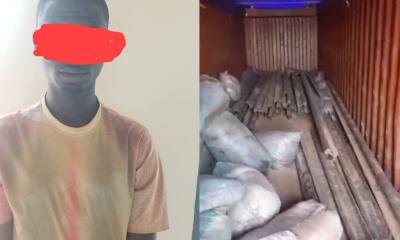
 Headlines2 months ago
Headlines2 months agoNRC police tracks down mastermind of railway vandalism in Kaduna
-
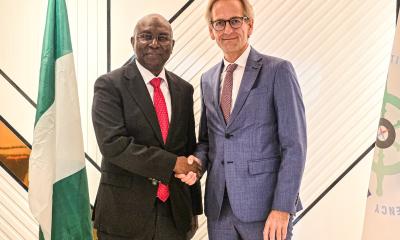
 Headlines2 months ago
Headlines2 months agoDenmark, Nigeria seek new areas of collaboration on maritime development
-

 Headlines4 weeks ago
Headlines4 weeks agoEx-NIWA boss, Oyebamiji, emerges most media-friendly CEO in maritime industry
-
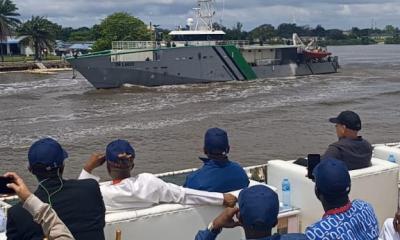
 Headlines3 months ago
Headlines3 months agoNigeria dazzles Dominguez, IMO scribe, with practical demonstration of deep blue assets capabilities.
-
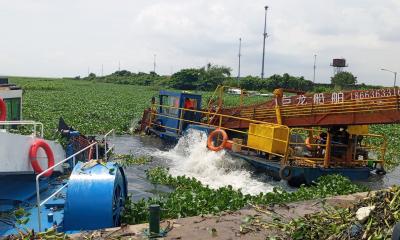
 Headlines2 months ago
Headlines2 months agoWater Hyacinth: An imported invasive aquatic menace NIWA is determined to fight in Nigeria
-
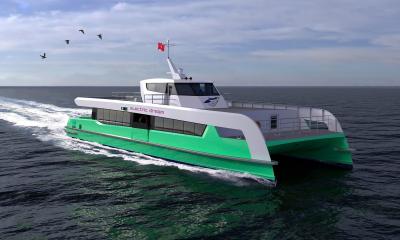
 Headlines3 months ago
Headlines3 months agoLagos government deploys 78 high-capacity electric ferries to kick- start launch of Omi Eko project

